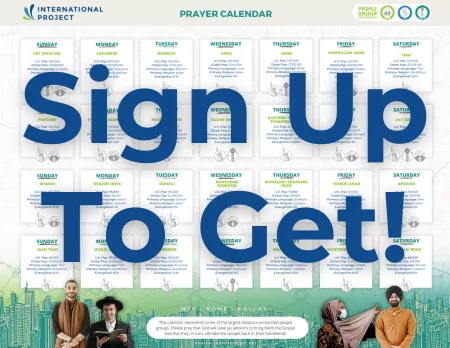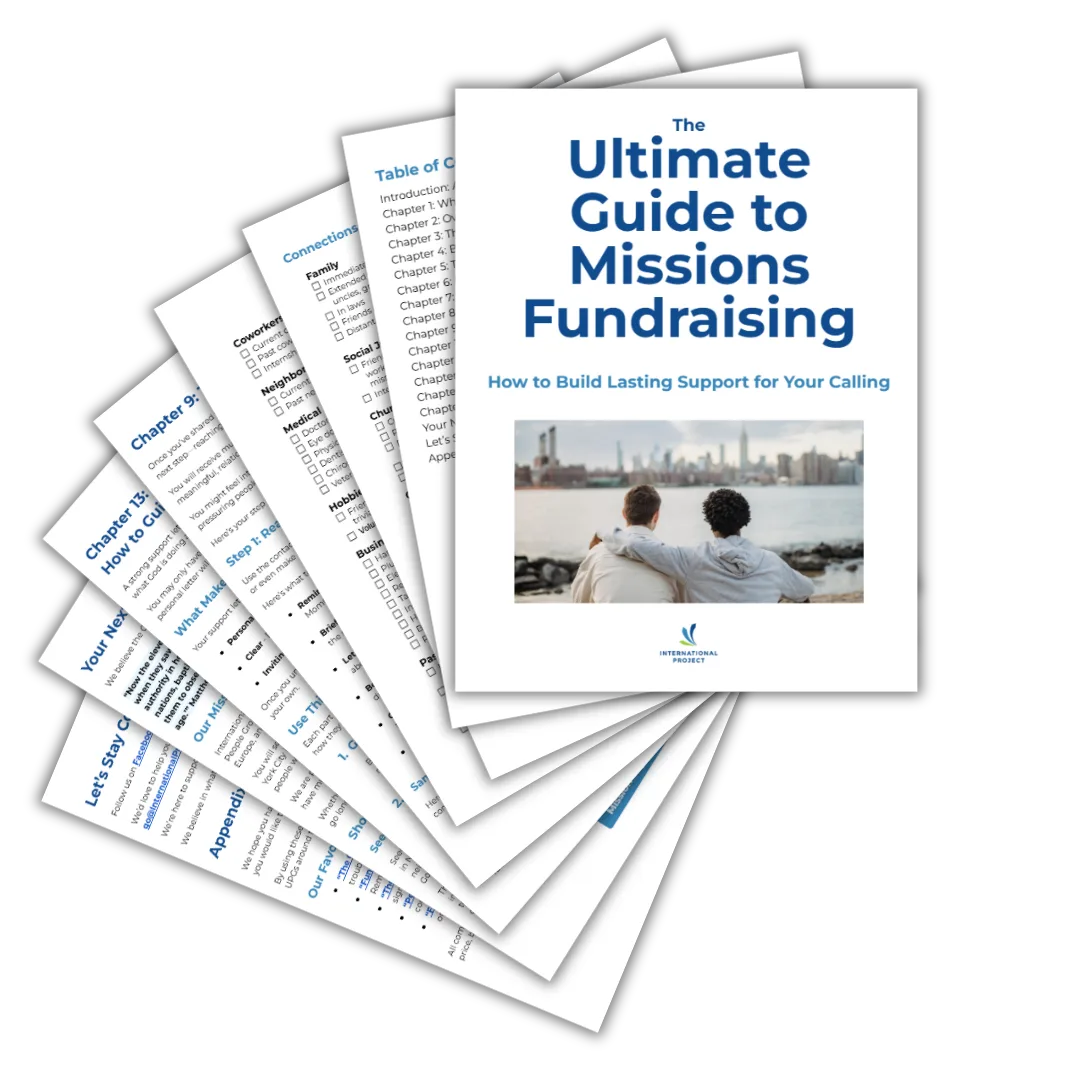No need to get on a plane—you can do diaspora missions, reaching the nations right where you are.
Did you know 1 in 30 people around the world live outside their country of origin?1 These migrant people are part of the diaspora.
Because of widespread global migration in the 21st century, Christians have a unique evangelistic opportunity for diaspora missions.
With diaspora people living all around us, we can show the love of Christ to people who previously had little or no access to the Gospel. You can engage in short term mission trips or even missionary training for long term work right here in America!
In this blog, you’ll find answers to your diaspora missions questions like:
- What is diaspora?
- Why is diaspora ministry important?
- How can I do evangelism and discipleship effectively among diaspora peoples?
First, let’s learn more about who makes up the diaspora and why it matters for the Great Commission.
What Is Diaspora?
The global diaspora refers to groups of people who have migrated from their homeland and now live in a foreign country.
In other words, they are dispersed outside their home to other places.
Examples of diaspora peoples include:
- Refugees
- International students
- Expats (moved for work or other opportunities)
Individuals from the diaspora are often referred to as migrants.
Many migrants gravitate towards their own ethnic groups when they move to a new country. In major cities, you often see communities of migrants living in the same neighborhoods as their diaspora people.
In Africa, for example, there is a growing number of Chinese diaspora people who have moved to Kenya for business opportunities.2
Likewise, there has been a great deal of emigration from Africa to Europe. Major European cities like Rome are home to thousands of diaspora people due to international migration.3
Related: Rome Europe Mission Trip
Diaspora Communities in the USA and Canada
Demographics show that the North American population is made up of many diaspora people.
North America, for example, is home to a large diaspora of Jewish people (living outside of their homeland of Israel).4 New York City, in particular, is home to 25% of all Jewish people in the United States.5
But Jewish people living outside of Jerusalem are just one of the many diaspora people groups in NYC.
Around ⅓ of the population of New York City was born outside of the United States,6 and NYC is home to nearly 200 ethnic groups.7 This makes NYC a strategic location for diaspora ministry!
International Project has traditional and bivocational opportunities for mission work among many diaspora groups. These groups typically represent countries where the Islamic, Hindu, and Buddhist religions are the most widely practiced.
Although there are many organizations or nonprofits that assist diaspora people (such as the Ministry of Diaspora Affairs), global mission organizations focus on diaspora ministry.
What Is Diaspora Missions?
Diaspora missions is cross cultural ministry to migrant people groups living outside their home country. The purpose of diaspora ministry is to share the Good News of Jesus with diaspora communities.
There are a number of North American and international mission organizations that engage in diaspora missions. These include:
- Diaspora Missions Collective – affiliated with the Southern Baptist Convention (SBC)
- North American Mission Board (NAMB) – also affiliated with the SBC
- Send Relief – a collaboration of the International Mission Board (IMB) and the NAMB
- International Project (IP)
At International Project, our diaspora ministry focus is outreach to diaspora peoples specifically from Unreached People Groups (UPG).
How are Unreached People Groups related to the diaspora?
Unreached People Groups
Did you know there are billions of people today who have no access to the Gospel? We call these people groups “unreached” because of their limited access to the Gospel.
We consider a people group unreached when there is no indigenous community of Jesus’ followers able to engage this people group with church planting. Technically speaking, in an Unreached People Group less than 2 percent of the population actively follows Jesus.
New York City is home to over 50 Unreached People Groups.8 This metropolitan city is the perfect place to engage in Christian missions outreach to the diaspora, whether short term or long term.
If you are a college or seminary student (or recent graduate), you can apply for a summer internship to gain experience doing diaspora missions.
Now that you know what the diaspora is and the missional opportunities it creates, let’s see why it’s strategic.
Why Is Diaspora Ministry Strategic?
The Lausanne movement—a visionary leader in ministry to UPGs—has emphasized the strategic nature of diaspora ministry.9
In a formal statement, the organization appealed to global mission and local church leaders to prioritize diaspora missiology. They define diaspora missiology as “a missiological framework for understanding and participating in God’s redemptive mission among people living outside their place of origin.”10
Prioritizing diaspora missiology and mission work is strategic for several reasons:
Living Abroad Creates Openness
After moving to a new place, diaspora people encounter new worldviews. Displacement—whether voluntary or forced—tends to shake up familiar cultural frameworks and create space for new ideas.
As diaspora individuals navigate unfamiliar environments, they encounter diverse worldviews and often become more spiritually curious. It’s at this juncture that we want to give them opportunities to hear about Jesus Christ and the Gospel.
Ministries that prioritize diaspora missiology recognize this window of receptivity and intentionally engage immigrants and international communities with relational, culturally sensitive outreach.
Related: Living Out Loud
Strong Ties Keep the Gospel Moving
What makes diaspora missions even more powerful is the enduring connection many immigrants maintain with their families and communities back home.
These transnational ties act as natural conduits for the Gospel, allowing the message to travel across borders—especially into regions where traditional missionary access is restricted or prohibited.
When diaspora believers share their faith with loved ones in closed countries, they become organic missionaries, bypassing barriers that formal mission structures cannot.
By equipping and mobilizing diaspora Christians, we can extend their reach into unreached and restricted areas, leveraging relational networks to carry the Good News of Jesus Christ where feet cannot go.
Influence Shapes Communities and Foreign Affairs
Diaspora peoples with education and resources can impact both local neighborhoods and their global networks. Potentially for the sake of the Kingdom!
Diaspora ministry opportunities abound in international cities where there are many dispersed people. Church leaders can be strategic in their mission work by focusing on diaspora mobilization.
At International Project, our vision is to see the diaspora mobilized to do evangelism and church planting through their own people.
The goal of our global missions initiatives is to see diaspora people come to know Jesus Christ and become church leaders of diaspora churches.
How does that happen? Let’s explore some important keys to diaspora missions in our final section.
If you want to become a missionary long term, you can apply for Equip, our 10 month missionary training program. Equip is a hands on missions mentoring program that will train you in missionary tasks important for diaspora ministry.
Diaspora Ministry Keys
Did you know North American citizens can receive training and get hands on experience reaching diaspora peoples in New York City?
At International Project, we’ve pioneered keys to diaspora ministry and give you the chance to do them too!
Here are some of the key methods we use to teach and train followers of Jesus like you about diaspora missions:
Engage Diaspora Communities through Broad Sowing
Broad sowing is initiating spiritual conversations and sharing the Gospel with individuals in public settings to find people open to hearing the Gospel or studying Scripture.
It’s not about forcing a message, but about listening well, asking thoughtful questions, and discerning openness. This method allows believers to cast a wide net, trusting that God is already at work in hearts and that some will respond with curiosity or a desire to learn more.
You can learn to share the Gospel with diverse communities in major cities with large populations of UPGs. At International Project, we offer mission trips for adults and high school mission trips to gain this cross cultural evangelism experience.
Disciple Individuals and Groups of UPGs to Jesus
Invest in sharing more about Jesus with those who show interest in spiritual conversations. Invite them to learn more about the Gospel through Discovery Bible Studies.
Studying the Bible together with a non believer is an effective way to disciple them to Christ!
Teach Diaspora Peoples to Share the Gospel
When a person chooses to follow Jesus, emphasize what Jesus taught in The Great Commission. Jesus placed a high value on obedience and making disciples, so that is what we encourage new believers to do too!
Encourage new UPG believers to share the Good News with their family and friends.
Initiate Diaspora Churches Through Indigenous Leadership
Allow the Holy Spirit to empower new followers of Jesus from diaspora peoples to start new churches. Encourage their indigenous leadership and calling to obey the Great Commission as followers of Christ.
When you follow these diaspora ministry keys, diaspora peoples will naturally take the Gospel message back to their home countries.
Diaspora missions is a strategic and effective method for reaching UPGs around the world!
Join Us in Prayer for Diaspora Unreached People Groups
Want to know more about diaspora peoples in North America? Get this FREE calendar to discover who they are and how you can pray for them to know Jesus.
For 28 days, you’ll get a diaspora UPG profile that includes:
- A snapshot of each group’s unique culture
- Locations where these diaspora people live
- Key stats on the least reached and how you can help change that
Sign up now to get your calendar and start your prayer journey for the nations next door!
Join Us in Prayer for Unreached People Groups
For 28 days, you’ll not only get a people group, brief description, and the locations where these Unreached People Groups are, but you’ll also learn some of the key stats about the least reached and what you can do to help change them.
Get Your Prayer Calendar Now!
We respect your privacy.🔒 Your email will only be used to send your calendar of prayer for Unreached People Groups and our related updates—unsubscribe anytime!

Starting in prayer is the most important thing that we can do!
Sources
- https://worldmigrationreport.iom.int/msite/wmr-2024-interactive/
- https://web.archive.org/web/20110611120555/http://www.whatsonxiamen.com/news_msg.php?titleid=492
- https://www.statista.com/statistics/736904/number-of-foreigners-in-rome-by-origin-italy/
- https://www.pewresearch.org/religion/2025/06/09/jewish-population-change/
- https://ajpp.brandeis.edu/documents/2020/JewishPopulationDataBrief2020.pdf
- https://data.census.gov/profile/New_York,_New_York?g=160XX00US3651000
- https://popfactfinder.planning.nyc.gov/explorer/cities/New%20York%20City?censusTopics=detailedRaceAndEthnicity
- UPG North America. (2024). Unreached Peoples by Population: New York. Tableau Public. https://public.tableau.com/app/profile/bud.houston/viz/PriorityScorebyPeopleGroup/PeoplesandPlaceswordcloud. Accessed September 23, 2024
- https://lausanne.org/statement/the-seoul-declaration-on-diaspora-missiology
- Ibid.


